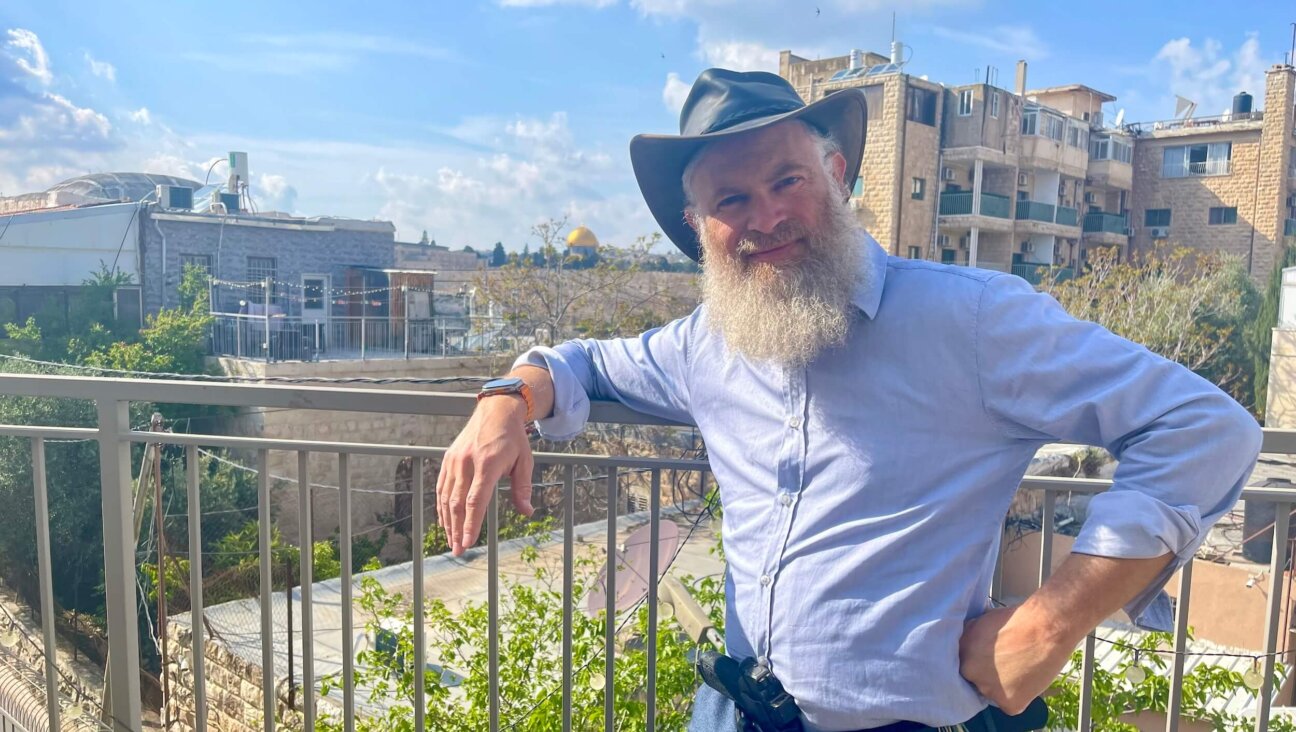A Night Full Of Maazel
YOU GOTTA HAVE A LITTLE MAAZEL — ISRAEL PHILHARMONIC ORCHESTRA BENEFIT
Led by conductor Lorin Maazel, the Israel Philharmonic Orchestra’s January 30 concert in New York at Carnegie Hall’s Isaac Stern Auditorium led off with a flawless rendition of Beethoven’s Leonore Overture No 3. Guest artist Maxim Vengerov performed a bravura interpretation of Beethoven’s Violin Concerto in D Major. The IPO evening dovetailed with a benefit gala for Meir Panim Relief Centers in Israel and a tribute to the late Leon Levy.
At the pre-concert dinner at Carnegie Hall’s Rohatyn Room, Meir Panim’s chairman, Michael From, defined the organization, founded in 2000, as “the biggest not-for-profit food and aid organization of its kind in Israel. [Though] its beneficiaries are largely secular Jews — often Russian and Ethiopian immigrants — it also serves non-Jews in peripheral areas of the country: Arabs, Druze, Bedouins and so on.” He informed that “over 400,000 Israeli families — nearly 25% of the population — are living in need, [and] 800,000 Israeli children (nearly one out of every three) live below the poverty line…. Meir Panim currently feeds 11,000 students in 40 schools daily.” From added, “In the town Kyriat Gat… we will prepare and deliver hot meals to 50,000 children each day.” Supporters at the gala included rabbis Haskell Lookstein, Myron Fenster, Mordechai Feuer[S?]tein, Arthur Schneier, Shlomo Hochberg and Raphael Butler, as well as Gideon Taylor and Greg Schneider (both with the Claims Conference) and Fanya Heller. At the dinner, Elsi Levy, an accomplished pianist — mother of four, grandmother of 10 and great-grandmother of two — spoke movingly about her late husband Leon Levy, who died last September at 84. Levy, a philanthropist and communal leader, Levy, was born to parents from Turkey and served in the U.S. Army during World War II. His many organizational hats included founding member of the Center for Jewish History, lifetime president of the American Sephardi Federation, past chairman of the Conference of President of Major American Jewish Organizations and founder and CEO of Urban Foundation Engineering LLC. His company constructed building foundations for the Citicorp Center, the World Financial Center at Battery Park, Ellis Island Restoration, the new Mets Stadium and the Statue of Liberty.
As I was leaving Carnegie Hall, songwriter-composer-performer Leo Fuld’s 1950s hit “Mazel” popped into my head. With lyrics that state, “You gotta have a little mazel, and mazel means good luck, and with a little mazel, you’ll always have a buck,” the connection with the Maazel-led IPO-Meir Panim evening benefit seemed a good fit. The gala helped raise more than $800,000. That buys a lot of hot meals!
. .
ALBANIAN ARITHMETIC —WHEN A ZERO MEANS “WINNER”
At the Anti-Defamation League’s January 17 International Rescuers Day, held at ADL headquarters, in honor of the Albanian people, it was noted that at Yad Vashem there are posters listing the Jewish Holocaust victims in all the Nazi-occupied countries. Albania’s poster is the only one with a zero.
Myriam Abramowicz, a filmmaker and a founder of the Hidden Child Foundation/ADL, was one of the speakers at that afternoon’s Courage to Care tribute honoring Mefail and Njazi Biçaku, who had risked their lives to save 26 Jews whom they shepherded to the backwoods of Qarrishte, Albania. (Abramowicz is working on a new film, “Illyria,” about Albania.) Mefail’s son Muhamet Biçaku, Njazi’s daughter Elida Hazbiu from Albania and Njazi’s son Qemal Biçaku — now living in the United States — were present to accept the award.
Few among the hundreds of guests in the room knew the saga of the Albanian peoples’ rescue not only of their own Jewish neighbors and citizens but also of all the Jews who managed to make it to their country. As Michael Salberg, the ADL’s director of international affairs, reported: “In September 1943, the Orthodox priests of Struga in Macedonia came to Mefail Biçaku asking for his help in saving Jews from the Germans. Seventeen-year-old Njazi was given the family’s old Italian carbine and told not to lose sight of his charges who stayed in the village during the winter.” Salberg described how the Biçakus shared their food with 26 people, and how his wife had washed their clothes…. The whole region knew that Mefail was hiding Jews, but “because of the complex rules of behavior in the mountains,” and the family’s reputation, no one betrayed him nor his charges. By the end of 1944, the Jews returned to Struga, with some making their way to Argentina and most landing in Israel.
Speakers at the event included Anna Kohen, president of Motrat Qiriazi, the Albanian Women’s Organization; Rachelle Goldstein, vice president of the Hidden Child Foundation/ADL, and Adrian Neritani, Albania’s ambassador to the United Nations. Many of the speakers cited the Albanian people’s national Code of Honor — known as bessa — which was compared to the talmudic injunction that when you give your word, it is sealed. Also noted was that the consequence of an Albanian breaking his word is not for the faint of heart. I don’t remember whether it was one of the speakers, or the voice-over in a scene from Abramowicz’s film, “Illyria,” that revealed an amazing fact: When Albanians saw someone in the street whom they suspected as being Jewish, they immediately spirited him/her away to a safe place. It was considered an honor to shelter Jews! Any wonder that some of the aging hidden-children survivors in the room were teary-eyed.
It took five decades for the full story to come to light. With the help of a translator, Muhamet Biçaku recalled how, in 1961, the communist government arrested his father for collaborating with Jews. “He died in prison in 1969,” Biçaku said. In 1972, the family received a letter from Argentina from one of the 26 Jews they had rescued. Since the letter had first been opened by the communist police, the family was targeted. In 1978, Muhamet’s brother was arrested; he spent seven years in jail.
Biçaku concluded his emotional acceptance address by lauding his father’s generosity and expressing “hope for the continued relationship between Israel and Albania.”
. .
“SALONIKA, CITY OF SILENCE” A FILM ABOUT HISTORIC AMNESIA
At the ADL’s Courage to Care Award ceremony, it was also revealed that the Albanians hid “all the Jews who [managed to escape] from Salonika, Greece.”
Maurice Amaraggi’s 2006 film “Salonika, City of Silence (Salonique. Ville du Silence) was screened February 3 at the Sephardic Film Festival. The screening [was sponsored by the American Sephardic Federation With Sephardic House and Yeshiva University Museum, and held at the Center for Jewish History. The film opens with a panoramic view of a modern Mediterranean city bustling with restaurants, young people and modern shops — but beneath those streets and under the walkway of its university lies Salonika’s centuries-old cemetery. The film unravels as an emotionally wrenching archaeological dig of a civilization and culture still within memory.
“Every trace of Jewish presence has been wiped out,” notes the voice-over in French (with English subtitles). Postwar, there was a shortage of stones, so Jewish tombstones were used to construct roads and even to build a swimming pool! It reminded me of the gravestones of Krakow, Poland’s Jews lining the road at the Plaszow concentration camp in Steven Spielberg’s “Schindler’s List.”
St. Dimitri’s Church, the patron saint of Salonika, which had been destroyed by fire in 1917, has been partly reconstructed using some of Salonika’s Jewish tombstones.
The film also includes wonderful Jewish family vignettes, talking heads, including the owners of Greece’s oldest bookstore and a Sephardic “Carmen,” one of the tobacco workers from the 1930s who still speaks Spanish. There are a few remnants of a Jewish presence: the De Hirsch Hospital is now a Greek hospital but was sold by the Hirsch family with the proviso that the name remain on the building. No one knows who the family was. Of the once 100 synagogues in Salonika, only two remain. On one of the plaques that records the centuries-long Jewish migrations to Salonika, one is inscribed: “Ashkenazim, 1376” from Poland.
There are still some Jews living in Salonika. They reminisce about festival celebrations with 25-30 relatives around the table enjoying food cooked by family members. Now dinners are short, everyone is busy and the prewar nostalgia is an unrelenting pain. The film shows students visiting the city’s Jewish museum, where the guide tells them that Salonika had been so Jewish a city that it was once called Yehudia. And just as small Ashkenazic groups now meet to learn the Yiddish of their ancestors, in Salonika there are small Ladino classes that try to impart to a few interested souls the glory of a once-upon-a-time culture.
In a bitter memory vignette, it is reported that in 1943, the local Red Cross made no mention of the deportations of Salonika’s Jews to Auschwitz to an international humanitarian operation bringing supplies to the starving city.
Had Salonika’s population behaved like the Albanians, their Yad Vashem poster might also have earned a zero — or a much lower figure than the soul-numbing cipher of tens of thousands.

I hope you appreciated this article. Before you go, I’d like to ask you to please support the Forward’s award-winning journalism this Passover.
In this age of misinformation, our work is needed like never before. We report on the news that matters most to American Jews, driven by truth, not ideology.
At a time when newsrooms are closing or cutting back, the Forward has removed its paywall. That means for the first time in our 126-year history, Forward journalism is free to everyone, everywhere. With an ongoing war, rising antisemitism, and a flood of disinformation that may affect the upcoming election, we believe that free and open access to Jewish journalism is imperative.
Readers like you make it all possible. Right now, we’re in the middle of our Passover Pledge Drive and we need 500 people to step up and make a gift to sustain our trustworthy, independent journalism.
Make a gift of any size and become a Forward member today. You’ll support our mission to tell the American Jewish story fully and fairly.
— Rachel Fishman Feddersen, Publisher and CEO
Join our mission to tell the Jewish story fully and fairly.
Our Goal: 500 gifts during our Passover Pledge Drive!
























